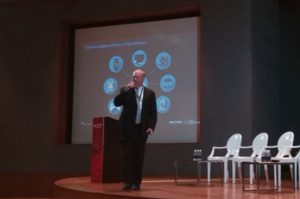 Will data centre owners be the “big winners” in the economy of the next decade in which the digital economy would expand even further? The answer is “yes”, at least according to William Barney, CEO Global Cloud Exchange and CEO of Reliance Communications who said “This Is The Golden Age For Data Centers. We are going faster than we ever thought” during Data Cloud Asia 2017 in Singapore.
Will data centre owners be the “big winners” in the economy of the next decade in which the digital economy would expand even further? The answer is “yes”, at least according to William Barney, CEO Global Cloud Exchange and CEO of Reliance Communications who said “This Is The Golden Age For Data Centers. We are going faster than we ever thought” during Data Cloud Asia 2017 in Singapore.
The new technologies change the current markets much faster than analysts and experts has ever predicted and data center businesses have to adapt to this process while at the same time keep successfully managing the associated challenges and overcome barriers to serve the digital economy, suggested Mr. Barney taking to the stage of the Data Cloud Asia conference n Singapore. He described that the process of adoption of Cloud computing is one of the most interesting phases in the modern economy as the technology landscape and the usage of Cloud computing is changing in real time and has dramatically shifted over the last year. According to Mr. Barney:
“Software has changed, hardware has changed, infrastructure has changed, the network has changed. All this has allowed big data to come in. What is enabling this is the cloud, and data centre operators are behind this. Anyone in the hosting space will tell you this is the golden age for data centers.”
According to him the “golden age” is evolving and the opportunities for providers that know how to take advantage from the current changes in the data cloud and computing industry will be huge.
Technology research firm Gartner says that by 2020 there will be 50 billion devices connected to Internet with 4 billion people using the Internet on a daily basis. Internet of things (IoT) is predicted to account for up to 3% of the world’s electrical consumption. The research firm also predicts that this will create a $5 trillion economy and a large demand for cloud services and data center services. The new IoT economy will require more orchestrated infrastructure, split into different size, class and niche IT facilities, which have to keep the connected world functioning 24/7. According to the CEO of Global Cloud Exchange:
“The networked data centre will be at the core of the future. Distributed focused compute centres will be the wave of the future. Orchestration is at the core. Data centres are not just about connectivity and the space. It is about having the whole ecosystem in place, have the network in place, orchestration facilities and IoT services.”
The CEO of Global Cloud Exchange has also pointed attention of the Data Cloud Asia conference attendees to the opportunities in emerging markets in the developing economies of Africa and Asia. According to him whoever makes the emerging markets a home for their business, will have an unprecedented advantage with huge demand ahead. “Innovating and expanding across emerging markets will reap biggest benefits for the cloud as requirements growth”, explains Mr. Barney.
75-percent of the world’s population lives in emerging markets, that is inadequately provided with a IT services or facilities for the digital economy. Therefore the emerging markets are those who would drive growth within the new digital economy. At this time there is no emerging market that has a clear data centre leader as most operators of IT facilities, Colocation and Cloud service providers are still focused in the most profitable North American and European markets.
 A federal judge has ruled out that there’s a big difference between providing hosting for infringing content and participating in copyright infringement.
A federal judge has ruled out that there’s a big difference between providing hosting for infringing content and participating in copyright infringement.